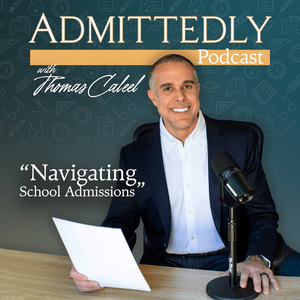To speak with an advisor and map out your student's next steps, book a Complimentary Strategy Call at admittedly.co/apply.
In this episode of the Admittedly Podcast, Thomas Caleel steps away from tactical admissions advice to share the story behind Admittedly — how it started, why it exists, and where it's headed next.
With nearly two decades inside selective admissions, including leading MBA Admissions and Financial Aid at Wharton, Thomas reflects on the experiences that shaped his philosophy as an educator, advisor, and parent. He talks candidly about his own path through boarding school, Penn, entrepreneurship, business school, and admissions leadership — and how working with thousands of families ultimately led him to build an education-first company focused on clarity, strategy, and integrity.
Thomas also explains why Admittedly has grown so quickly: families are exhausted by hacks, shortcuts, and resume-stuffing advice — and are looking instead for honest guidance grounded in real admissions experience. From launching the podcast and free resources to building Early Edge Plus and Early Edge Premium, this episode lays out the long-term vision for how Admittedly supports students not just to get into college, but to become confident, independent, resilient adults.
This episode is especially valuable for new listeners, parents considering professional guidance, and families who want to understand what truly differentiates Admittedly from traditional college consulting.
Key Takeaways:
Admissions outcomes are driven by strategy and intention, not checklists or hacks.
Experience inside elite admissions offices fundamentally changes how guidance should be delivered.
Education sits at the core of Admittedly's mission.
Group learning, multiple admissions perspectives, and intentional planning create stronger outcomes.
The goal isn't just college admission, but building confident, capable young adults.
Listeners can continue the conversation by following @admittedlyco on Instagram and TikTok, where Thomas shares weekly guidance and answers real family questions. Free downloads, webinars, and additional resources are available at admittedly.co.
To speak with an advisor and map out your student's next steps, book a Complimentary Strategy Call at admittedly.co/apply.


